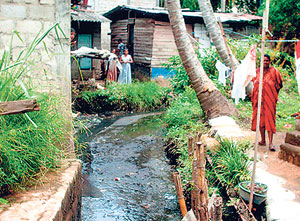With dengue on the rampage, the authorities have mobilized all forces under a Presidential Task Force to battle this tiny mosquito which has made 17,250 ill and left 113 dead in the first six months of this year.
Dengue cannot be fought by one or two ministries in isolation but through a concerted effort by all relevant ministries, officials pointed out, explaining that the Presidential Task Force for the Prevention of Dengue is already in action.
Headed by President Mahinda Rajapaksa and coordinated by the Health Ministry, the high-powered Ministries that are working together closely not only to prevent but also to control dengue are Education, Environment, Defence, Public Administration, Local Government and Provincial Councils, Disaster Management and Media and Information, the Sunday Times learns.
The Presidential Task Force appointed in May and activated on June 5 is due to meet on July 5 to review progress, as dengue cases rose this year when compared to the same period last year. In the first six months of last year, there were 15,384 cases of dengue, according to Epidemiology Unit data.
The dengue battle is being fought at all levels -- national, provincial, district, division and grama seva, the Sunday Times understands,
 |
 |
| File pix: Dengue-breeding sites |
The control of the dengue mosquito (vector) is necessary to prevent the spread of the disease and the issue was looked at objectively by Health Minister Maithripala Sirisena, said Health Ministry Secretary Dr. Ravi Ruberu, explaining that the Presidential Task Force will plan, implement and monitor the dengue control programme at the grassroots level under the supervision of the higher levels.
“The Presidential Task Force will fix responsibilities. Then we know who is responsible for what,” he said, adding, that dengue management is carried out by the Health Department and state hospitals are geared to cater to dengue patients.
Pointing out that the biggest problem is the public not being committed, he said that even in households where dengue deaths have occurred, the premises have not been cleared of mosquito breeding areas.
Dr. Ruberu attributed dengue deaths to delays in patients seeking treatment or doing so from places not capable of handling them.
While the Presidential Task Force will coordinate efforts to prevent the spread of dengue, reducing duplication of work and resolving cross-sector issues, the National Dengue Control Unit will continue to work with the state and private sector organizations, non-governmental organizations and clubs etc.
The duties of the ministries on the Presidential Task Force cover all aspects.
The Public Administration Ministry is to ensure public and private institutions are free of mosquito breeding places; the Education Ministry is to ensure public and private schools are free of breeding areas, promote healthy behaviour among schoolchildren, ensure close collaboration with public health officers, get schoolchildren to check out breeding places even in their homes and get their parents to destroy them; the Environment Ministry is to bring in a solid-waste disposal system; the Local Government and Provincial Councils Ministry is to strengthen solid-waste disposal systems, remove non-degradable solid waste effectively, strengthen the legal framework and assign responsibilities to households; the Defence Ministry is to ensure that all institutions under it are free of breeding areas while providing Police and Civil Defence Force support in dengue prevention activity; and the Media and Information Ministry is to make the public aware on prevention activity as well as the symptoms and treatment of dengue.
Meanwhile, the Provincial Committees are headed by the respective Governors and comprise the Chief Ministers, Chief Secretaries, Provincial Health Directors; the District Committees by the District Secretaries and comprise the Deputy Directors of Heath Services and other public servants and the Divisional Committees by the Divisional Secretaries and comprise Medical Officers of Health (MOHs) and other officials.
The Divisional Committees are further devolved to village-level groups in each Grama Niladhari Division and comprise the team working at the grassroots such as the Public Health Officers, the Grama Niladharis, the Samurdhi Niyamakas, agricultural officers etc, explained the Additional Secretary of the Health Ministry, Sarath Chandrasiri Vithana who is co-ordinating the work.
Questions loom over NHSL
Has the premier National Hospital of Sri Lanka (NHSL) become a spreader of dengue and dealer of death?
Four patients who came for treatment of other diseases to the NHSL contracted dengue and died while two more are suspected to have died due to the same reason, with another 26 also getting the disease while in hospital, the Sunday Times learns.
How do we know from where these people have contracted dengue, queried NHSL Director Dr. Hector Weerasinghe when contacted by the Sunday Times.
When pointed out that if the relevant dengue victims have been long-term patients of the hospital then most probably they would have contracted the disease there as the incubation period is about two weeks, Dr. Weerasinghe explained that as far as he knows only one patient had got dengue while in hospital.
Inviting the Sunday Times to come take a look at the NHSL, he said that they carried out shramadana campaigns every week on the 32-acre premises and smaller clean-ups in specific areas every few days but canals as well as unauthorized structures like boutiques around the hospital were breeding grounds for the mosquito.
“We have informed the Colombo Municipal Council (CMC) to do something about it. We can’t keep the mosquito out with a 6’ parapet wall,” he said, adding that the NHSL has even removed the gutters within its premises to prevent the collection of water.
Explaining that the CMC is doing everything possible to prevent the spread of dengue, Commissioner Bhadrani Jayawardhane said that fogging and other activity have been carried out by the staff not only outside the NHSL but also inside.
Referring to the deaths, she said there have been only four deaths from dengue within the city but four more deaths within the NHSL, making a total of eight, while pointing out that there are unauthorised structures elsewhere as well but the CMC’s anti-dengue campaign is strong.
With regard to unauthorized structures, she requested the Sunday Times to contact Special Commissioner Omar Kamil but several attempts to do so failed.
No sustained effort
doctors complain
Dengue has been plaguing Sri Lanka for over 20 years and some senior doctors were of the view that though committees may be appointed whenever it took the form of an epidemic, no sustained effort was being made to prevent and control it in the long-term.
“Everyone gets activated when the figures start rising but after awhile they lose interest and it takes its natural course, coming down when the rains cease,” one senior doctor said.
The dengue prevention and control campaign must start from the moment any building is being constructed – gutters are a major problem. Can’t the city planners get together with engineers and design buildings without gutters, he said.
Another source who has been involved in the dengue issue asked why no action is being taken against illegal constructions and neglected bare lands. Even in some apartment blocks people have put up illicit constructions over drains etc.
“In the rural areas, the mosquito breeding places are large water storage tanks while in the urban areas they are construction sites, gutters, discarded tyres as well as small containers within and outside homes,” said the source, adding that the situation is further aggravated by non-collection of garbage. One tiny drop of clean water is adequate for the dengue mosquito to lay its eggs.
All the high-level committees and detailed plans are welcome, but evaluation is of utmost importance. Three months after such plans are implemented, checks must be done to see whether the plans have worked or failed. Otherwise, while such plans lie on shelves gathering dust in offices and numerous meetings are held without actually seeing to the ground reality, men, women and children continue to die, the source added. |



